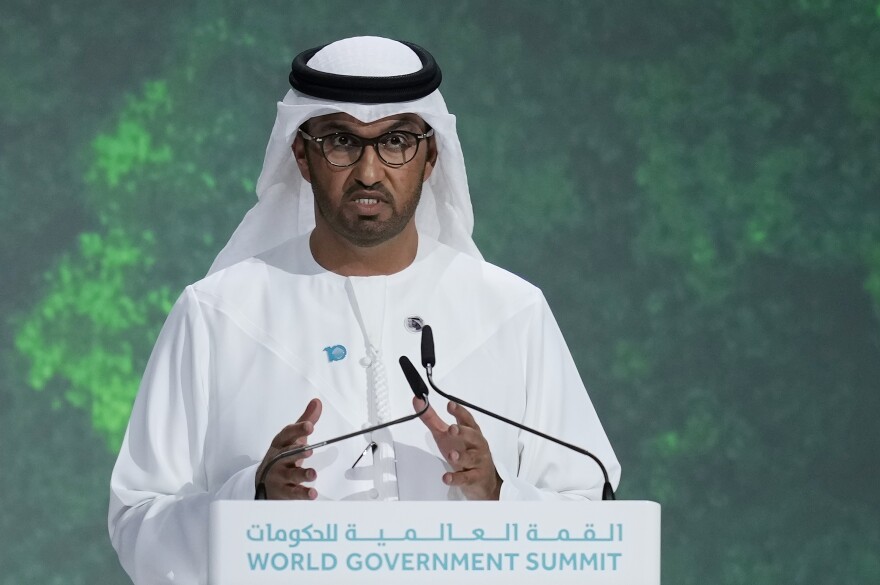A top oil company CEO who will lead international climate talks later this year told energy industry power players on Monday that the world must cut emissions 7% each year and eliminate all releases of the greenhouse gas methane — strong comments from an oil executive.
"Let me call on you to decarbonize quicker," Sultan al-Jaber, CEO of the Abu Dhabi National Oil Co., said at the Ceraweek conference, held in Houston.
But al-Jabar did not directly address emissions from transportation, where most crude oil ends up. Emissions from transport are the largest contributor to climate change in many countries, including the United States.
Al-Jaber singled out electricity, cement, steel and aluminum as targets for cleanup, but not trucks, cars, trains and aircraft. He called for far greater investment to speed the transition to cleaner industries.
"According to the IEA, in 2022, the world invested $1.4 trillion in the energy transition," he said. "We need over three times that amount."
And that investment, he said, must flow to the developing world.
"Only 15% of clean tech investment reaches developing economies in the global south, and that is where 80% of the population live," he stressed.
Al-Jaber did not call for the phasing out of oil and gas production and use, something that scientists and advocates have been demanding unsuccessfully over repeated COPs, short for Conference of the Parties, where nations meet to make climate commitments.
According to the International Energy Agency, to avoid the worst climate changes, there must be no new oil and gas infrastructure built out.
The United Arab Emirates leader said his country was first in its region to commit to the Paris climate agreement, and to set a pathway to net zero emissions. But its emissions in 2021 were up 3%, not down, from the year before, according to the Global Carbon Project. They were however 6% below the country's peak in 2015. According to Climate Action Tracker, UAE has an overall rating of "highly insufficient," meaning its projected emissions are not in line with limiting warming to 1.5 degrees Celsius.
The Abu Dhabi National Oil Co. pumps approximately 4 million barrels of crude a day and plans on expanding to 5 million barrels daily.
Each year, nations gather at the COP to discuss how Paris Agreement goals to limit global warming to just 1.5 degrees Celsius (2.7 degrees Fahrenheit) by 2050, can be achieved through international collaboration.
The 28th such conference, COP28, will be held in Dubai, Nov 30 to Dec. 12. The choice of country has drawn criticism given the nation's high, and growing level of crude production. The choice of al Jaber, CEO of the national oil company, has also drawn scorn. However, U.S. Climate Envoy John Kerry has said he backs the UAE leader.
As president of this year's meeting, al-Jaber will have influence over how much pressure is brought to bear on those most reponsible for climate change, countries and companies that produce and burn coal, oil and gas.
Al-Jaber is the UAE minister of industry and advanced technology, and also serves as the chairman of Masdar, a renewable energy company.
Ceraweek attracts high level oil and gas officials each year and is hosted by S&P Global.
Copyright 2023 NPR. To see more, visit https://www.npr.org.







